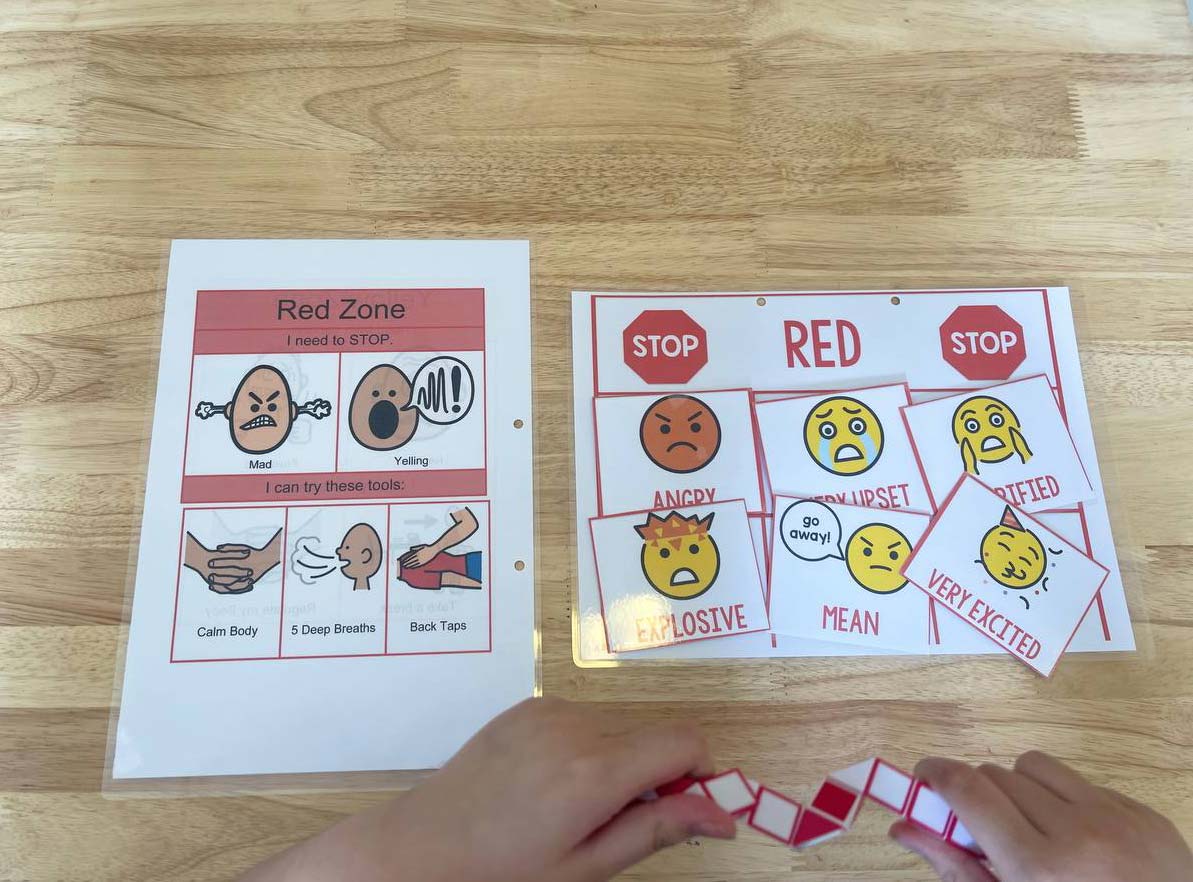Navigating the complexities of emotions can be a challenging task for individuals of all ages. The Zones of Regulation, provide a framework for understanding, identifying, and managing emotions effectively. This framework is particularly beneficial for individuals with emotional regulation challenges, such as those with autism spectrum disorder (ASD) or attention deficit hyperactivity disorder (ADHD).
Understanding the Zones
The Zones of Regulation framework categorizes emotions into four distinct zones, each associated with a specific color and level of arousal:
- Blue Zone: Calm and Alert
The Blue Zone represents a state of calm and alertness, characterized by feelings of peace, focus, and readiness to learn. When in the Blue Zone, individuals are able to engage in effective problem-solving, make sound decisions, and maintain positive relationships.
- Green Zone: Happy and Engaged
The Green Zone reflects a state of happiness and engagement, where individuals feel enthusiastic, optimistic, and motivated. In the Green Zone, individuals are more likely to participate actively in activities, demonstrate empathy, and build strong social connections.
- Yellow Zone: Frustrated and Anxious
The Yellow Zone signifies a state of frustration and anxiety, characterized by feelings of irritability, nervousness, and difficulty concentrating. When in the Yellow Zone, individuals may experience increased muscle tension, racing thoughts, and heightened sensitivity to external stimuli.
- Red Zone: Angry and Out of Control
The Red Zone represents a state of intense anger and emotional dysregulation, where individuals feel overwhelmed, impulsive, and unable to control their emotions. In the Red Zone, individuals may exhibit behaviors such as yelling, aggression, or self-harm.
Strategies for Self-Regulation
The Zones of Regulation framework not only categorizes emotions but also provides a comprehensive set of strategies for self-regulation, enabling individuals to recognize their emotional state and take appropriate actions to manage their emotions effectively. These strategies can be categorized into three main groups:
-
Sensory Strategies: These strategies involve utilizing sensory tools and activities to influence emotional states, such as deep breathing exercises, mindfulness practices, or engaging in calming sensory experiences.
-
Behavioral Strategies: These strategies involve modifying behaviors to promote emotional regulation, such as taking breaks, engaging in physical activity, or practicing relaxation techniques.
-
Cognitive Strategies: These strategies involve changing thought patterns to influence emotional states, such as using positive self-talk, challenging negative thoughts, or practicing gratitude.
Applications of the Zones of Regulation
The Zones of Regulation framework has been successfully implemented in various settings, including schools, homes, and therapeutic environments, to promote emotional intelligence and social-emotional learning. By providing a common language and framework for understanding emotions, the Zones of Regulation empower individuals to develop self-awareness, enhance self-regulation skills, and build resilience.
Conclusion
The Zones of Regulation offers a valuable tool for navigating the complex landscape of human emotions. By understanding the different zones and employing effective self-regulation strategies, individuals can develop the skills necessary to manage their emotions effectively, fostering well-being and enhancing their overall quality of life.
Find out if your child needs extra support today!
- My child screams hysterically
- My child is mean to other children
- My child is always worried
- My child is scared to go to school
- My child is scared of loud noises
- My child doesn’t know how to read
- My child is scared to play outside
- My child does not respond to his name
- My child always gets in trouble
- My child fights with other children
- My child doesn’t know how to count
If you are concerned about your child’s development, contact us for Assessments: Phone/Telegram: 077.455.993 – Telegram Link: https://t.me/OrbRom
If you are concerned about your child’s development, contact us for Assessments.
Phone/Telegram: 077.455.993 Link: https://t.me/OrbRom






Leave A Comment